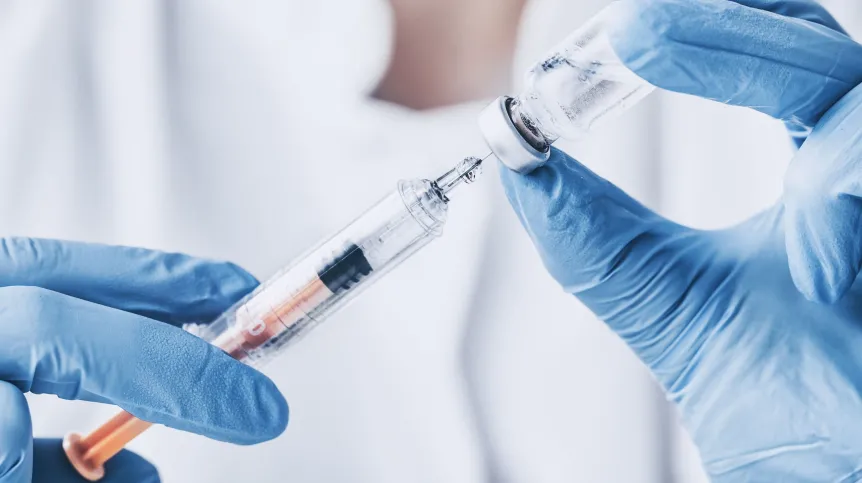
Current data from the UK show over a 90 percent reduction in the number of hospitalisations and deaths. SARS-CoV-2 vaccines protect against severe disease, but the pandemic depends on the behaviour of people, says Professor Krzysztof Pyrć, head of the Laboratory of Virology at the Małopolska Centre of Biotechnology of the Jagiellonian University.
PAP: Looking at COVID-19 statistics, you can feel confused. In the UK, where 80 percent of the population have received two doses of vaccine and 90 percent received one dose, there are now over 4 times more infections, over 4 times more hospitalisations and over 3 times more deaths than in the same period a year ago. The vaccination leader Israel also records strong increases. How can this be explained?
Professor Krzysztof Pyrć: This disease has some seasonal features, but SARS-CoV-2 is not a seasonal virus. For example, we have already seen high waves in some countries in the middle of the summer. The main limiting factor is our behaviour. Meanwhile, in the UK, due to the high percentage of the vaccinated, the decision to open was taken.
PAP: People are vaccinated, yet still there are deaths.
KP: But their number is many times lower than during previous waves. This is the best example that shows the effectiveness of vaccines. That is our goal: if the threat associated with illness decreases, then the risk is simply lower and stops destabilizing our lives.
Another thing is that if, for example, we vaccinate 90 percent of people from risk groups, then the majority of infections will concern the vaccinated group. The effectiveness of the vaccine is not 100 percent. The most important thing is that, for example, all current published data from the United Kingdom show a reduction in the number of hospitalisations and deaths.
PAP: In the UK, with such a high percentage of vaccinated, there are nearly 40,000 new infections per day. How is that possible if mainly the unvaccinated spread the infection? Some are afraid that vaccines do not work.
KP: That is not true. A vaccinated person has a significantly reduced risk of infection, and an even smaller risk of spreading the virus. It is still possible but less likely in the case of an unvaccinated person.
PAP: What is happening in Israel?
KP: This country carried out intensive vaccinations in the beginning, but their pace dropped over time. In Poland we have 51 percent of fully vaccinated people, in Israel it is over 60 percent. Recently, there was an analysis of this phenomenon in the Science. Its authors show that mainly the unvaccinated carry the infection.
PAP: If that is the case, why do so many vaccinated people in Israel end up in hospitals?
KP: You have to keep in mind that many people were vaccinated a long time ago. The research conducted in Israel indicates that immunity weakens over time and protection against severe disease may no longer be full in people from high risk groups. Therefore, the authorities of this country have decided to administer a third dose, in this case to the entire population, although risk groups are the most important.
PAP: What is the significance of immunity decreasing over time, and what of the appearance of the Delta variant?
KP: Delta is not a particularly escape variant, meaning that vaccines retain very good effectiveness against it. But it does spread much more easily. There is more of it in the airways, and this makes the risk of transmission much greater than in the case of the original variant. This results in a much deeper penetration of the population by the virus.
PAP: Should we expect weakening immunity over time also after the third dose?
KP: First of all, it must be emphasised that immunity does not disappear completely. Secondly, according to the current state of knowledge, the immune system produces stronger protection when it encounters a certain pathogen more times. But it is difficult to precisely predict what the reaction will be - whether immunity after the third dose will be retained for the rest of your life, for 10 years, a year or another 6 months. That would be guessing.
PAP: There are voices that the third dose should not be administered when so many people have not yet received two doses. There are two reasons: one is practical, that some people remain unvaccinated, the other is ethical, that many countries do not have enough vaccine doses.
KP: Many people not being vaccinated with two doses is something that keeps me awake at night. We are entering the winter period, and the Delta variant has already multiplied quite well in our population. Many people in the 80+ age group have not been vaccinated. Many of them will be seriously ill, some will die.
PAP: What about the moral and ethical issues?
KP: WHO has this to say: there are countries where less than 1 percent have been vaccinated, so we can not afford the comfort of vaccinating everyone with the third dose. Firstly, we should share. Secondly, looking at the issue in a more selfish way, our situation also depends on the poorer countries because with the developing epidemic, new, dangerous variants can emerge there and eventually also reach us.
But there are groups that certainly need a third dose, for example persons with weakened immunity.
PAP: Can we hope that herd immunity will now start to develop, on the one hand thanks to vaccinations, on the other - asymptomatic infections?
KP: Asymptomatic infections only account for 20-30 percent of all cases. In Poland, the number of infections was unfortunately very high, so a part of the population will have immunity also thanks to this. But it is too early to draw such conclusions. (PAP)
Marek Matacz
mat/ zan/ kap/
tr. RL













